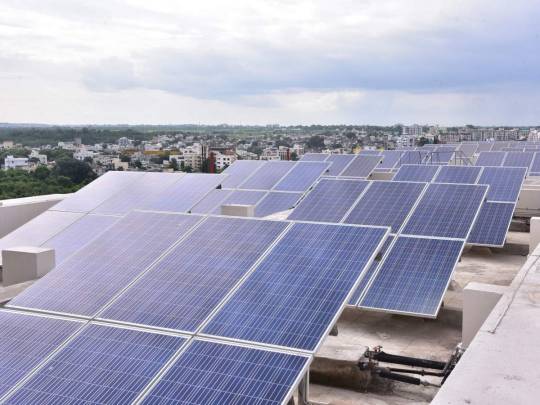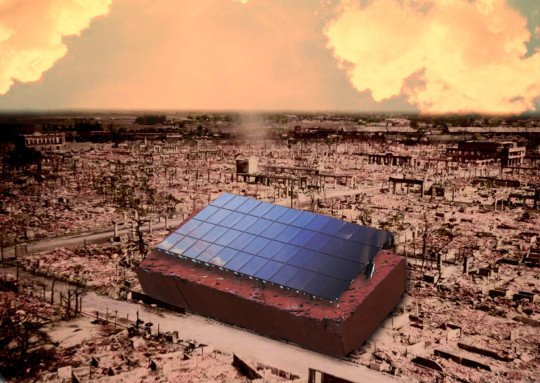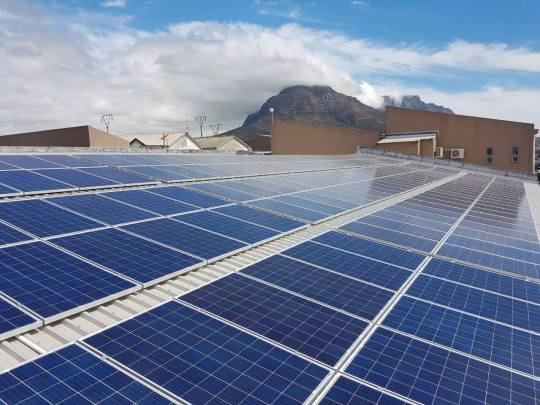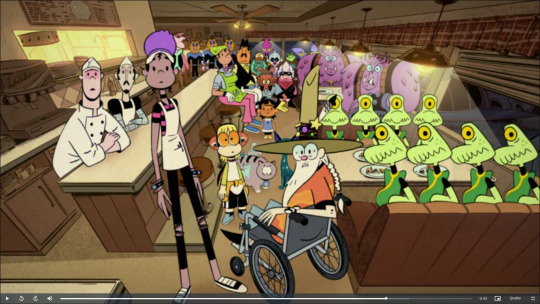#solar for businesses
Text
How to Choose the Right Commercial Solar System for Your Business

When it comes to having a commercial solar system installed, there are a number of factors to consider. Some of them include whether you want it to be grid-tied or off-grid, and how much maintenance and permitting will be required.
Grid-tie
Grid-tie commercial solar system is a photovoltaic system that connects to the power grid. It's an efficient system that can save you money on your monthly energy bills. With a proper design, you may be able to get zero net electricity usage charges.
When you choose to go with a grid-tie system, you can have the option to import and export power. This lets you use your own electricity and also sell any surplus power to your utility company. You can then put that credit toward your electricity bill.
One benefit to grid-tie solar systems is that you won't have to worry about running out of power in the middle of the night. The system is designed to shut off automatically when there isn't enough sunlight for your solar panels to produce power. In addition, you won't have to pay for a backup battery system.
Hybrid
Hybrid commercial solar systems offer a number of advantages and benefits. They provide a safety net during power outages, provide a guaranteed electricity supply, reduce your dependence on the utility grid, and provide a scalable energy source for future needs.
In addition to the typical components found in a grid-tied system, hybrid systems incorporate the latest advancements in battery technology. Lithium batteries are not only smaller and less bulky than traditional batteries, but they also have better energy storage capabilities.
The main advantage of a hybrid system is that it can reduce your dependence on the utility grid. As a result, you have more control over your electricity use. And, with clever controls, you can maximize your usage of the solar power your system generates.
Another advantage of a hybrid system is that you will have a battery backup - a nice perk when the weather is not cooperating. During outages, your system will keep the lights on and the refrigerator running.
Permitting
Permitting a commercial solar system can be an expensive and time-consuming process. It's important to have a complete understanding of the requirements. This can help ensure a smooth installation.
First, a local utility may need to conduct an on-site inspection of the site for the installation. They will also require a wiring diagram and spec sheet.
Next, the installation contractor will obtain the required permits. They will include the cost of the permit in the total cost of the system. Depending on the jurisdiction, the cost of a solar permit could be a few hundred dollars.
Finally, the AHJ will review the solar permit application and approve or deny it. The process may take a day, a week or more.
While the process is complex, the actual permit can be as simple as sending an email to your local utility. Some towns have made the permitting process automated.
Maintenance
If you are thinking about investing in a commercial solar system for your business, you will want to make sure you are protecting your investment. A properly installed system should be in good condition for many years. However, it is important to maintain it regularly to ensure that it performs at its best.
The best way to ensure your system operates at its best is to perform routine inspections and maintenance. There are a number of factors that can impact a solar energy system's performance.
Solar panels are relatively inexpensive, but they may degrade over time if not maintained correctly. For example, a thick film of dust can severely impact the panel's ability to capture sunlight. This is why it is a good idea to have a professional clean your panels each year.
Off-grid
An off-grid commercial solar system is a cost-effective way to reduce energy costs. It can also be an environmentally friendly way to run your business. Whether you are a large corporation or a small business, an off-grid system can help you lower your power bill.
Unlike on-grid solar systems, off-grid systems are independent of the utility grid. They are designed to produce excess electricity during the day, and store the power in batteries. The stored energy can be used during the night.
Off-grid solar systems are ideal for those living in rural areas, and for businesses that are not connected to the electric grid. However, they are not for those living in urban areas. While they are often less expensive than on-grid systems, they are still more expensive than traditional grid-connected systems.
#solar companies sydney#solar companies in sydney#commercial solar system#industrial solar panel output#commercial solar panels australia#solar for businesses
1 note
·
View note
Text
Cleantech has an enshittification problem

On July 14, I'm giving the closing keynote for the fifteenth HACKERS ON PLANET EARTH, in QUEENS, NY. Happy Bastille Day! On July 20, I'm appearing in CHICAGO at Exile in Bookville.

EVs won't save the planet. Ultimately, the material bill for billions of individual vehicles and the unavoidable geometry of more cars-more traffic-more roads-greater distances-more cars dictate that the future of our cities and planet requires public transit – lots of it.
But no matter how much public transit we install, there's always going to be some personal vehicles on the road, and not just bikes, ebikes and scooters. Between deliveries, accessibility, and stubbornly low-density regions, there's going to be a lot of cars, vans and trucks on the road for the foreseeable future, and these should be electric.
Beyond that irreducible minimum of personal vehicles, there's the fact that individuals can't install their own public transit system; in places that lack the political will or means to create working transit, EVs are a way for people to significantly reduce their personal emissions.
In policy circles, EV adoption is treated as a logistical and financial issue, so governments have focused on making EVs affordable and increasing the density of charging stations. As an EV owner, I can affirm that affordability and logistics were important concerns when we were shopping for a car.
But there's a third EV problem that is almost entirely off policy radar: enshittification.
An EV is a rolling computer in a fancy case with a squishy person inside of it. While this can sound scary, there are lots of cool implications for this. For example, your EV could download your local power company's tariff schedule and preferentially charge itself when the rates are lowest; they could also coordinate with the utility to reduce charging when loads are peaking. You can start them with your phone. Your repair technician can run extensive remote diagnostics on them and help you solve many problems from the road. New features can be delivered over the air.
That's just for starters, but there's so much more in the future. After all, the signal virtue of a digital computer is its flexibility. The only computer we know how to make is the Turing complete, universal, Von Neumann machine, which can run every valid program. If a feature is computationally tractable – from automated parallel parking to advanced collision prevention – it can run on a car.
The problem is that this digital flexibility presents a moral hazard to EV manufacturers. EVs are designed to make any kind of unauthorized, owner-selected modification into an IP rights violation ("IP" in this case is "any law that lets me control the conduct of my customers or competitors"):
https://locusmag.com/2020/09/cory-doctorow-ip/
EVs are also designed so that the manufacturer can unilaterally exert control over them or alter their operation. EVs – even more than conventional vehicles – are designed to be remotely killswitched in order to help manufacturers and dealers pressure people into paying their car notes on time:
https://pluralistic.net/2023/07/24/rent-to-pwn/#kitt-is-a-demon
Manufacturers can reach into your car and change how much of your battery you can access:
https://pluralistic.net/2023/07/28/edison-not-tesla/#demon-haunted-world
They can lock your car and have it send its location to a repo man, then greet him by blinking its lights, honking its horn, and pulling out of its parking space:
https://tiremeetsroad.com/2021/03/18/tesla-allegedly-remotely-unlocks-model-3-owners-car-uses-smart-summon-to-help-repo-agent/
And of course, they can detect when you've asked independent mechanic to service your car and then punish you by degrading its functionality:
https://www.repairerdrivennews.com/2024/06/26/two-of-eight-claims-in-tesla-anti-trust-lawsuit-will-move-forward/
This is "twiddling" – unilaterally and irreversibly altering the functionality of a product or service, secure in the knowledge that IP law will prevent anyone from twiddling back by restoring the gadget to a preferred configuration:
https://pluralistic.net/2023/02/19/twiddler/
The thing is, for an EV, twiddling is the best case scenario. As bad as it is for the company that made your EV to change how it works whenever they feel like picking your pocket, that's infinitely preferable to the manufacturer going bankrupt and bricking your car.
That's what just happened to owners of Fisker EVs, cars that cost $40-70k. Cars are long-term purchases. An EV should last 12-20 years, or even longer if you pay to swap the battery pack. Fisker was founded in 2016 and shipped its first Ocean SUV in 2023. The company is now bankrupt:
https://insideevs.com/news/723669/fisker-inc-bankruptcy-chapter-11-official/
Fisker called its vehicles "software-based cars" and they weren't kidding. Without continuous software updates and server access, those Fisker Ocean SUVs are turning into bricks. What's more, the company designed the car from the ground up to make any kind of independent service and support into a felony, by wrapping the whole thing in overlapping layers of IP. That means that no one can step in with a module that jailbreaks the Fisker and drops in an alternative firmware that will keep the fleet rolling.
This is the third EV risk – not just finance, not just charger infrastructure, but the possibility that any whizzy, cool new EV company will go bust and brick your $70k cleantech investment, irreversibly transforming your car into 5,500 lb worth of e-waste.
This confers a huge advantage onto the big automakers like VW, Kia, Ford, etc. Tesla gets a pass, too, because it achieved critical mass before people started to wise up to the risk of twiddling and bricking. If you're making a serious investment in a product you expect to use for 20 years, are you really gonna buy it from a two-year old startup with six months' capital in the bank?
The incumbency advantage here means that the big automakers won't have any reason to sink a lot of money into R&D, because they won't have to worry about hungry startups with cool new ideas eating their lunches. They can maintain the cozy cartel that has seen cars stagnate for decades, with the majority of "innovation" taking the form of shitty, extractive and ill-starred ideas like touchscreen controls and an accelerator pedal that you have to rent by the month:
https://www.theverge.com/2022/11/23/23474969/mercedes-car-subscription-faster-acceleration-feature-price
Put that way, it's clear that this isn't an EV problem, it's a cleantech problem. Cleantech has all the problems of EVs: it requires a large capital expenditure, it will be "smart," and it is expected to last for decades. That's rooftop solar, heat-pumps, smart thermostat sensor arrays, and home storage batteries.
And just as with EVs, policymakers have focused on infrastructure and affordability without paying any attention to the enshittification risks. Your rooftop solar will likely be controlled via a Solaredge box – a terrible technology that stops working if it can't reach the internet for a protracted period (that's right, your home solar stops working if the grid fails!).
I found this out the hard way during the covid lockdowns, when Solaredge terminated its 3G cellular contract and notified me that I would have to replace the modem in my system or it would stop working. This was at the height of the supply-chain crisis and there was a long waiting list for any replacement modems, with wifi cards (that used your home internet rather than a cellular connection) completely sold out for most of a year.
There are good reasons to connect rooftop solar arrays to the internet – it's not just so that Solaredge can enshittify my service. Solar arrays that coordinate with the grid can make it much easier and safer to manage a grid that was designed for centralized power production and is being retrofitted for distributed generation, one roof at a time.
But when the imperatives of extraction and efficiency go to war, extraction always wins. After all, the Solaredge system is already in place and solar installers are largely ignorant of, and indifferent to, the reasons that a homeowner might want to directly control and monitor their system via local controls that don't roundtrip through the cloud.
Somewhere in the hindbrain of any prospective solar purchaser is the experience with bricked and enshittified "smart" gadgets, and the knowledge that anything they buy from a cool startup with lots of great ideas for improving production, monitoring, and/or costs poses the risk of having your 20 year investment bricked after just a few years – and, thanks to the extractive imperative, no one will be able to step in and restore your ex-solar array to good working order.
I make the majority of my living from books, which means that my pay is very "lumpy" – I get large sums when I publish a book and very little in between. For many years, I've used these payments to make big purchases, rather than financing them over long periods where I can't predict my income. We've used my book payments to put in solar, then an induction stove, then a battery. We used one to buy out the lease on our EV. And just a month ago, we used the money from my upcoming Enshittification book to put in a heat pump (with enough left over to pay for a pair of long-overdue cataract surgeries, scheduled for the fall).
When we started shopping for heat pumps, it was clear that this was a very exciting sector. First of all, heat pumps are kind of magic, so efficient and effective it's almost surreal. But beyond the basic tech – which has been around since the late 1940s – there is a vast ferment of cool digital features coming from exciting and innovative startups.
By nature, I'm the kid of person who likes these digital features. I started out as a computer programmer, and while I haven't written production code since the previous millennium, I've been in and around the tech industry for my whole adult life. But when it came time to buy a heat-pump – an investment that I expected to last for 20 years or more – there was no way I was going to buy one of these cool new digitally enhanced pumps, no matter how much the reviewers loved them. Sure, they'd work well, but it's precisely because I'm so knowledgeable about high tech that I could see that they would fail very, very badly.
You may think EVs are bullshit, and they are – though there will always be room for some personal vehicles, and it's better for people in transit deserts to drive EVs than gas-guzzlers. You may think rooftop solar is a dead-end and be all-in on utility scale solar (I think we need both, especially given the grid-disrupting extreme climate events on our horizon). But there's still a wide range of cleantech – induction tops, heat pumps, smart thermostats – that are capital intensive, have a long duty cycle, and have good reasons to be digitized and networked.
Take home storage batteries: your utility can push its rate card to your battery every time they change their prices, and your battery can use that information to decide when to let your house tap into the grid, and when to switch over to powering your home with the solar you've stored up during the day. This is a very old and proven pattern in tech: the old Fidonet BBS network used a version of this, with each BBS timing its calls to other nodes to coincide with the cheapest long-distance rates, so that messages for distant systems could be passed on:
https://en.wikipedia.org/wiki/FidoNet
Cleantech is a very dynamic sector, even if its triumphs are largely unheralded. There's a quiet revolution underway in generation, storage and transmission of renewable power, and a complimentary revolution in power-consumption in vehicles and homes:
https://pluralistic.net/2024/06/12/s-curve/#anything-that-cant-go-on-forever-eventually-stops
But cleantech is too important to leave to the incumbents, who are addicted to enshittification and planned obsolescence. These giant, financialized firms lack the discipline and culture to make products that have the features – and cost savings – to make them appealing to the very wide range of buyers who must transition as soon as possible, for the sake of the very planet.
It's not enough for our policymakers to focus on financing and infrastructure barriers to cleantech adoption. We also need a policy-level response to enshittification.
Ideally, every cleantech device would be designed so that it was impossible to enshittify – which would also make it impossible to brick:
Based on free software (best), or with source code escrowed with a trustee who must release the code if the company enters administration (distant second-best);
All patents in a royalty-free patent-pool (best); or in a trust that will release them into a royalty-free pool if the company enters administration (distant second-best);
No parts-pairing or other DRM permitted (best); or with parts-pairing utilities available to all parties on a reasonable and non-discriminatory basis (distant second-best);
All diagnostic and error codes in the public domain, with all codes in the clear within the device (best); or with decoding utilities available on demand to all comers on a reasonable and non-discriminatory basis (distant second-best).
There's an obvious business objection to this: it will reduce investment in innovative cleantech because investors will perceive these restrictions as limits on the expected profits of their portfolio companies. It's true: these measures are designed to prevent rent-extraction and other enshittificatory practices by cleantech companies, and to the extent that investors are counting on enshittification rents, this might prevent them from investing.
But that has to be balanced against the way that a general prohibition on enshittificatory practices will inspire consumer confidence in innovative and novel cleantech products, because buyers will know that their investments will be protected over the whole expected lifespan of the product, even if the startup goes bust (nearly every startup goes bust). These measures mean that a company with a cool product will have a much larger customer-base to sell to. Those additional sales more than offset the loss of expected revenue from cheating and screwing your customers by twiddling them to death.
There's also an obvious legal objection to this: creating these policies will require a huge amount of action from Congress and the executive branch, a whole whack of new rules and laws to make them happen, and each will attract court-challenges.
That's also true, though it shouldn't stop us from trying to get legal reforms. As a matter of public policy, it's terrible and fucked up that companies can enshittify the things we buy and leave us with no remedy.
However, we don't have to wait for legal reform to make this work. We can take a shortcut with procurement – the things governments buy with public money. The feds, the states and localities buy a lot of cleantech: for public facilities, for public housing, for public use. Prudent public policy dictates that governments should refuse to buy any tech unless it is designed to be enshittification-resistant.
This is an old and honorable tradition in policymaking. Lincoln insisted that the rifles he bought for the Union Army come with interoperable tooling and ammo, for obvious reasons. No one wants to be the Commander in Chief who shows up on the battlefield and says, "Sorry, boys, war's postponed, our sole supplier decided to stop making ammunition."
By creating a market for enshittification-proof cleantech, governments can ensure that the public always has the option of buying an EV that can't be bricked even if the maker goes bust, a heat-pump whose digital features can be replaced or maintained by a third party of your choosing, a solar controller that coordinates with the grid in ways that serve their owners – not the manufacturers' shareholders.
We're going to have to change a lot to survive the coming years. Sure, there's a lot of scary ways that things can go wrong, but there's plenty about our world that should change, and plenty of ways those changes could be for the better. It's not enough for policymakers to focus on ensuring that we can afford to buy whatever badly thought-through, extractive tech the biggest companies want to foist on us – we also need a focus on making cleantech fit for purpose, truly smart, reliable and resilient.

Support me this summer on the Clarion Write-A-Thon and help raise money for the Clarion Science Fiction and Fantasy Writers' Workshop!

If you'd like an essay-formatted version of this post to read or share, here's a link to it on pluralistic.net, my surveillance-free, ad-free, tracker-free blog:
https://pluralistic.net/2024/06/26/unplanned-obsolescence/#better-micetraps

Image:
臺灣古寫真上色 (modified)
https://commons.wikimedia.org/wiki/File:Raid_on_Kagi_City_1945.jpg
Grendelkhan (modified)
https://commons.wikimedia.org/wiki/File:Ground_mounted_solar_panels.gk.jpg
CC BY-SA 4.0
https://creativecommons.org/licenses/by-sa/4.0/deed.en
#pluralistic#procurement#cleantech#evs#solar#solarpunk#policy#copyfight#copyright#felony contempt of business model#floss#free software#open source#oss#dmca 1201#interoperability#adversarial interoperability#solarization#electrification#enshittification#innovation#incumbency#climate#climate emergency
424 notes
·
View notes
Text


my brothers been playing elden ring recently and he let me draw his character ^_^
#cant remember the original context for drawing his character pinned against the wall by Malenia#i just remember thinking it would be funny LOL. he really likes her armor but doesnt like the foot gear cuz of her weird toes#i think theyre supposed to be prosthetics...?? but im not really interested in playing elden ring so i didnt bother to look it up#i think the preceptors set especially the hat looks really cool.. i love how the brim has stars and planets shaped like a solar system#so cool.. the sanguine noble robe and travelers chestpiece have to be my favorites but i also like the night maiden headdress#its just a little hard to pair it with other armor pieces bc i like things for The Drip. the gloves with the cloth lining are soo pretty#he also gave his character a cool blind eye by making the left eye white and then adding a scar over it and it SEVERELY FUCKS#he let me pick the hair and i went for short hair cuz it felt the most practical. but he doesnt give his player character any kind of#backstory either so he doesnt think abt it that hard. too busy fighting eldritch bird fetus dragons i guess. i like rya though#my art#myart#doodles#oc#??? sort of?????#elden ring#malenia blade of miquella#elden ring malenia
203 notes
·
View notes
Text
“Under this bill, when an item is broken, it could be a cellphone like this, a dishwasher, a washing machine, or a laptop, Coloradans will have the information they need to repair their own equipment or use the repair provider of their own choice,”
This builds on Colorado’s right-to-repair laws that were already introduced for agricultural equipment and powered wheelchairs, extending similar protections to almost any consumer electronic device with a chip.
Like Oregon’s right-to-repair law, Colorado’s HB24-1121 explicitly prohibits electronics manufacturers from using “parts pairing” to prevent replacement components from working unless approved by company software.
Device manufacturers have until January 1st, 2026, to comply
#solarpunk#solarpunk business models#solarpunk business#startup#solar punk#right to repair#repair#business opportunities#colorado#new law
192 notes
·
View notes
Text
sun and moon show tumblr dashboard simulator. because i find these hilarious and this fandom needs one. assume this takes place in a "bad shit happens, but everyone's still on speaking terms" au for it to make the most sense kfjhsfd
0 notes

🌠 worldrecordnutellaeater Follow
when the nightmare goes so hard when you wake up you have to walk into the ocean just to make sure
🌎 princessandthepaupersupreme Follow
Lunar, are you okay..?
🌠 worldrecordnutellaeater Follow
guess
22 notes

👤 sunsthirdfingerjoint Follow
ok but the creator is kind of a dilf tho
🦙 TSAJSwillprevail Follow
he's killed hundreds
👤sunsthirdfingerjoint Follow
is a man not allowed to be a manic pixie dream girl in this day and age
🛸 moonenjoyer9315 Follow
guys are we just ignoring op's url
536 notes

☣️ mellorinefuega Follow
coming across montgomery gator in the wild is crazy. like i was just trying to make a deposit at the bank one time and he came up behind me and punched the teller in the face
🐩 hottodoggors Follow
op my girlfriend went thru a similar experience a few months ago. this dude sounds like a menace, fr. so happy hes not near me.
🐊 trustmewithyourinformation Follow
182.62.250.90
🐩 hottodoggors Follow
is that my fukcign ip address
1,102 notes

🌎 princessandthepaupersupreme Follow
This is a gentle reminder that everything will be okay, you just have to give it time!!!
🌎 princessandthepaupersupreme Follow
im seriously at my limit
🌎 princessandthepaupersupreme Follow
Just give it time, everyone!!!
🔧 applejackenjoyer Follow
earth are you okay
🌎 princessandthepaupersupreme Follow
guess
🌑 twilightsparkleno1fan Follow

🔧 applejackenjoyer Follow
nexus NO
179 notes

🪔 cloudandloud Follow
eclipse v2 and nexus are one in the same. hit post. and go to bed
🪔 cloudandloud Follow
i just woke up. ive never been this scared to look at notes in my life
979 notes

💡 ballogmore Follow
i love going to the pizzaplex with my little sister bc she's there for the glamrocks. i'm there to see if i can get my hands on that twinky little jester
🔋 buttonsandbatterypacks Follow
Which twinky little jester op
💡 ballogmore Follow
the daycare attendant model??? whomst the fuck else?????
🔋 buttonsandbatterypacks Follow
You'd be surprised how little that narrows it down, actually
34,343 notes

🧛🏿♀️ horseonabeach-man Follow
🗡️ leavethatlittleguyalone Follow
bro what did v2 do to you
🧛🏿♀️ horseonabeach-man Follow
exist
557 notes

☀️ catdadofthedecade Follow
every day i try to not let my brother rob a bank, and then every day he provides me good reasons as to why i should let him
🌕 ricksanchezreborn Follow
sun do yuo know what you could do with the money
☀️ catdadofthedecade Follow
i dont want to know, moon
🌕 ricksanchezreborn Follow



☀️ catdadofthedecade Follow
do you need a getaway diver
52 notes

🌊 themagicwawa Follow
"sun is so cute!! solar's such a dilf. nexus being insane is so ho-"
absolutely none of you can handle what i have to say about him

99 notes

👾 certifiedrobotfracker
god help me, hes so fine

🏝 chronicappleeater-deactiaved062324
yeah, him and all 5 pixels
👾 certifiedrobotfracker
i see god smited you for this one
😈 itsme-fromthebible
wrong deity, but appreciate it regardless
👾 certifiedrobotfracker
THE DEVIL FROM THE BIBLE??!?!
823,383 notes

🦌 dailydazzledeer Follow

☀️ catdadofthedecade Follow
if anything happens to this blog i genuinely hope taurus destroys the planet
55,932 notes

🦫 elchipichipichapachapa Follow
it's taken months, but i've finally finished it. the document explaining everything wrong with the sun and moon show
here's the link. enjoy
732 notes

☀️ catdadofthedecade Follow
every time one of us makes them mad, moon and nexus get closer to becoming the Hitachiin twins from ohshc to retaliate, and i fear the day they decide to just do it
🌕 ricksanchezreborn Follow
even the thought of doing that is stupid
🌑 twilightsparkleno1fan Follow
even the thought of doing that is stupid
☀️ catdadofthedecade Follow
HOW DID YOU BOTH REBLOG AT THE EXACT SAME TIME THIS POST HAS BEEN UP FOR 4 MINUTES
18 notes

🟦 woobificationofthesillies Follow
"we need more evil women in the world!!!" you people cant even handle miku
932,382 notes

🌠 worldrecordnutellaeater Follow
starting a conspiracy theory that we're all just puppets in a youtube show's script and that's why our lives are so miserable
🌠 worldrecordnutellaeater Follow
hey guys why was i shadowbanned after posting this
8 notes

#tsams#the sun and moon show#sams#sun and moon show#the lunar and earth show#tlaes#lunar and earth show#laes#tumblr dashboard simulator#funny things tag#lunar (tsbs)#earth (tsbs)#sun (tsbs)#old moon (tsbs)#new moon/nexus (tsbs)#solar (tsbs)#'why isnt eclipse in this?' hes too busy with the two Leash Children in the new dimension fdkjsdf
106 notes
·
View notes
Text

A PressureBeast for day 10 of @hermitadaymay !!
#my art#Hermitcraft#hermitcraft fanart#stressmonster#stressmonster101#stressmonster fanart#stressmonster101 fanart#she was SUPER fun to draw! Honestly I’m sad so much of her got covered up by such chunky clothes I was really happy with my shapes!#Also sadly I’ve resigned to having missed drawing Skizz… I hope to go back and get the ones I miss at the end of the month#so far I’ve only fully missed Skizz and TFC since I put the little extra keralis in xB’s so the list of things I didn’t get is fairly short#and I’m not busy much of tomorrow so I hope to get a head start on some of the upcoming ones#I’m VERY excited to draw pearl with her mail carrier fit and the solar punk stuff- I LOVE solar punk it’s so fun so that’ll be nice to draw#and I’ve got Sundays planned and hope to at least start on it tomorrow because I have work on Sunday.#ANYWAYS have an art
124 notes
·
View notes
Text
Consider: Lucien as the hottie who's installing solar panels on Elain's roof
#Helion made his fortune in the solar panel business and Lucien needs to learn the ropes#and Elain is definitely an eco friendly girlie#Elucien
93 notes
·
View notes
Text
My sibling made ihnmaims fanart... AM binder AM

Her tt is @/64angrygorillas go support him
#ihnmaims#i have no mouth and i must scream#i have no mouth and i must scream fanart#fanart#digital art#supporting small businesses#solar panel art#gay
86 notes
·
View notes
Note
Just wanted to say that when I saw the news about the sun spots and solar activity this weekend, my immediate thought was "oh, guess Dairine and Roshaun and Filif and Sker'ret are up there fixing things up again," and that made me happy to think about.
(grin) Thanks.
120 notes
·
View notes
Text
Solar Return : Partnerships (7th House)
Solar Return 7th House in Aries: This placement may bring dynamic and action-oriented partnerships, encouraging assertiveness and enthusiasm in collaborations. It could signify the need for independence and mutual support in relationships or partnerships, urging you to be mindful of potential conflicts and maintain a balance of power in business ventures.
Solar Return 7th House in Taurus: This placement suggests stable and reliable partnerships built on trust and shared values. It may encourage a focus on nurturing and cultivating enduring relationships or partnerships, emphasizing the importance of patience and commitment in both personal and professional connections.
Solar Return 7th House in Gemini: This placement signifies versatile and communicative partnerships, emphasizing the importance of intellectual connection and mutual understanding. It may encourage you to foster open and transparent communication in relationships or partnerships, promoting adaptability and flexibility in collaborative endeavors.
Solar Return 7th House in Cancer: This placement suggests nurturing and empathetic partnerships, highlighting the significance of emotional support and security. It may encourage a focus on creating a sense of belonging and comfort in relationships or partnerships, fostering a deep emotional bond and a shared sense of belonging in business collaborations.
Solar Return 7th House in Leo: This placement signifies passionate and expressive partnerships, emphasizing the importance of mutual respect and admiration. It may encourage you to celebrate individuality and creativity in relationships or partnerships, fostering a sense of shared vision and a strong sense of teamwork in business ventures.
Solar Return 7th House in Virgo: This placement suggests practical and supportive partnerships built on organization and efficiency. It may encourage a focus on attention to detail and mutual reliability in relationships or partnerships, emphasizing the importance of clear communication and shared responsibilities in collaborative endeavors.
Solar Return 7th House in Libra: This placement signifies harmonious and balanced partnerships, highlighting the importance of cooperation and fairness. It may encourage you to prioritize diplomacy and mutual understanding in relationships or partnerships, fostering a sense of equality and cooperation in both personal and professional connections.
Solar Return 7th House in Scorpio: This placement suggests intense and transformative partnerships, emphasizing the importance of trust and emotional depth. It may encourage you to embrace vulnerability and shared passions in relationships or partnerships, fostering a sense of empowerment and mutual growth in business collaborations.
Solar Return 7th House in Sagittarius: This placement signifies adventurous and expansive partnerships, highlighting the importance of shared experiences and a sense of exploration. It may encourage you to embrace diversity and open-mindedness in relationships or partnerships, fostering a spirit of adventure and shared optimism in collaborative endeavors.
Solar Return 7th House in Capricorn: This placement suggests pragmatic and enduring partnerships, emphasizing the importance of commitment and mutual ambition. It may encourage you to prioritize stability and long-term goals in relationships or partnerships, fostering a sense of reliability and shared responsibility in business collaborations.
Solar Return 7th House in Aquarius: This placement signifies progressive and innovative partnerships, highlighting the importance of shared ideals and intellectual connection. It may encourage you to embrace collaboration and teamwork in relationships or partnerships, fostering a sense of originality and shared vision in collaborative endeavors.
Solar Return 7th House in Pisces: This placement suggests compassionate and intuitive partnerships, emphasizing the importance of empathy and spiritual connection. It may encourage you to prioritize emotional support and creativity in relationships or partnerships, fostering a sense of compassion and shared dreams in both personal and professional connections.
#astrology#love astrology#astrology 7th house#astrology business#astrology observations#astrology solar return#solar return#7th house#solar return 7th house
165 notes
·
View notes
Text
Tax Incentives For Commercial Solar Systems

There are some tax incentives that you can use to help defray the cost of installing a commercial solar system. For a little extra, you can also have a system installed with trackers so that you can get more panels per kilowatt.
Trackers allow for more panels per Kilowatt
Solar trackers are devices that allow solar panels to follow the sun's path. This increases the amount of energy they can produce. These devices can be installed on roofs or ground-mounted.
Most trackers use motors to move the solar panels to the direction of the sun. However, some active trackers use GPS to help maximize energy production.
Trackers can help increase the efficiency of a commercial or residential solar installation. They can also help commercial projects with limited roof space. In addition, they can reduce the number of panels needed to power a building.
As the solar industry grows, trackers may become less expensive. However, it is important to consider all of your needs before investing in one. The best option will depend on the available space, your energy needs, and your budget.
Some trackers can be installed on flat rooftops, but they are generally installed on ground-mounted arrays. Installations on flat rooftops can cause the solar panels to be more susceptible to wind damage.
Ground-mounted systems are cost-effective for businesses with rooftops that are not suitable for solar
If your business does not have a suitable roof for solar installation, a ground-mounted commercial solar system may be the best way to go. It can offer several benefits, including greater flexibility and a more affordable cost.
For businesses, the most obvious benefit is that the panels can be tilted to catch more sun. This can help keep the sun from heating up the building, allowing it to stay cooler.
Depending on your location, you may also be able to take advantage of tax incentives. These incentives vary by state, property type and size of the system. The savings can be recovered almost immediately in the first year of operation.
A ground-mounted system can be installed on unused land, including former industrial sites. In some cases, capped landfills can be used as well.
When choosing between rooftop and ground-mounted solar, it's important to know how the panels will be installed. Generally, rooftop systems require less metal and require no soil survey. On the other hand, ground-mounted panels require additional structure and a more thorough inspection.
Tax incentives defray the cost of installation
There are a variety of tax incentives that can defray the cost of commercial solar system installation. They can help you lower your energy costs and shorten the time it takes to see positive returns on investment. If you are considering installing solar, talk to your local experts to learn more.
One of the most important current solar incentives is the federal solar investment tax credit. This is a one-time deduction of 30% of the total cost of the system. It has no cap on the value of the credit.
The investment tax credit is available for both residential and commercial systems. In addition to the federal credit, several states offer tax credits as well. For example, New York residents can deduct up to 25 percent of the cost of a qualified solar energy system from their state taxes. However, if you receive an additional rebate, the state credit won't be able to reduce the federal credit.
Another type of tax incentive is the Solar Massachusetts Renewable Target (SMART) program. This program was created by the Massachusetts Department of Energy Resources and investor-owned utilities.
Maintenance of a commercial solar system
If you're planning to install a commercial solar system, it's a good idea to create a preventative maintenance schedule. This will help to ensure that the system will continue to operate in its best possible condition. In addition, this will help to reduce the risk of breakdowns or technical problems degrading the system's performance.
The first step in creating a preventative maintenance schedule is to create a document for the project. It should include information such as the system's components, installation records, and user manuals for the solar equipment. Also, it should include a schedule for maintenance and inspections.
During a regular solar panel maintenance visit, a technician will inspect the components, the mounting framework, the inverter, and the junction boxes. He will also check the electrical connections, make sure that the cables are securely fastened, and evaluate the overall performance of the system.
As with any electrical system, a solar array is vulnerable to sudden failures. This can occur due to a number of different factors, including damage caused by wind, debris, or bad weather.
#solar for businesses#commercial solar panels australia#industrial solar panel output#commercial solar system#solar companies in sydney#solar companies sydney#30kw on grid solar system
0 notes
Text


















🤗🥰🤗The classic found family trope always be my favorite trope in media, whether live-action or animated, it's incredibly heartwarming and it gets me everytime!🤗🥰🤗
#arlo the alligator boy#i heart arlo#adventure time#scream 2022#archer fx#inside job#dead end paranormal park#Eternals#x men 97#Team squad#uncle grandpa#the wachowskis#rottmnt#sonic cinematic universe#kid cosmic#business family forever#core four#final space#amphibia#disney's the owl house#Solar opposites#tervo#found family#marvel mcu#i love it so much#rise of the teenage mutant ninja turtles#scream iv#dadspeed#mao mao heroes of pure heart#power rangers dino charge
87 notes
·
View notes
Text

scopOphilic_micromessaging_939 - scopOphilic1997 presents a new micro-messaging series: small, subtle, and often unintentional messages we send and receive verbally and non-verbally.
#scopOphilic1997#scopOphilic#digitalart#micromessaging#streetart#graffitiart#graffiti#brooklyn#nyc#photographers on tumblr#original photographers#ArtistsOnTumblr#2024#Every Artist Is A Small Business#RWK#Nouns Plaster#AWAKELIKEANOWL#Eclipse Glasses#Solar Eclipse#blackandwhite#red#yellow#black#green#grey
66 notes
·
View notes
Text
Ritchie speaks to BBC Future Planet about what shifted her mindset, why the world might be reaching overall "peak pollution" – and ways that a more sustainable future could be secured.
What prompted you to change your mind about humanity's future? And why do you now think that "doomist" predictions do not inspire action?
Climate change has always been part of my life and I've always been quite worried, even as a kid. That got worse when I went to university, because I was studying environmental science and all the trends were very much going in the wrong direction. At the time I felt very anxious, hopeless, and like these problems were completely unsolvable.
The feeling of 'it's too late' just leads to inaction and paralysis – Hannah Ritchie
A key turning point for me was discovering the work of the Swedish physician and statistician Hans Rosling. When I was studying, I'd assumed that all of the human wellbeing metrics – such as global poverty, mortality and hunger – were also getting worse alongside the environmental ones. But Rosling would do TED talks where he'd show, using data, how the world had changed over the last few centuries for the better.
So, I started asking: can we do both things at the same time? Can we continue to improve human wellbeing while also reducing our environmental impact? And, over the last 10 years or so, according to the environmental data, there have been signs for cautious optimism. It's not inevitable that we get there, but I think there's the opportunity for us to do so.
110 notes
·
View notes
Text
TSAMS,LAES,MGAFS review time!

So, Goodbye Eclipse, I guess it's nice he had a kinda little redemption arc, it's sad to see him go but it's for the best. Also the ending has me worried they really hammered it home that Earth really cares for Sun. Davis, Reed, DON'T DO THIS TO ME! DON'T MAKE ME SAD!
Also, can we talk about the differences between Earth and Lunar's expressions.

Earth looks sad and concerned...

And Lunar is just like, " And this affect me,how?"🤣 Seriously bless the person who makes their thumbnails.

SOLAR'S COMING BACK!!!!!! Eclipse actually did it. He saved Solar. But Sun does bring up a good point. "Why is Dusk(Dark Sun) helping? Why would he? What does he get out of it? WHAT IS DARK SUN'S GAME?!!?!?!?

And last but not least, Moon's coming back soon too gonna be a great reunion! But new problem... SUN KNOWS! Sun knows Monty and Puppet are bringing back Moon, and he clearly isn't happy, I mean, why would he? He's trading one Moon for another, and I feel like Sun is just done with Moons altogether(Maybe that's Dark Sun's goal? 🤔 make him hate Moon and ditch his family?) . Also, the ending.... are.. are they hinting that Henry help Creator build Sun and Moon! Are Sun and Moon technically Henry's kids?
#sun and moon show#tsams#moondrop#lunar and earth show#monty and foxy#sundrop#earth#Lunar#Solar#Eclipse#tsams eclipse#tsams solar#welcome back old moon#solar's coming back!#Goodbye Eclipse#Sun isn't doing well#Is Henry Creators' business partner?
51 notes
·
View notes
Text

♪ Now Playing ▶︎ Maritime Memory
#was a little busy yesterday#splatoon#maritime memory#saltspray rig#agent 3#dj sango#solar eclipse#april 8 2024
63 notes
·
View notes